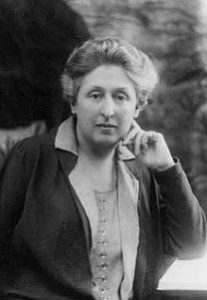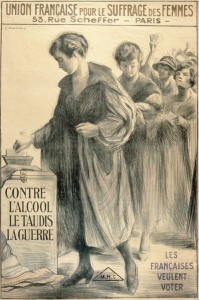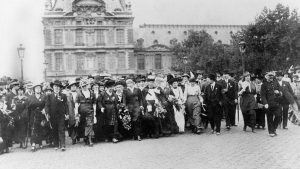French Union for Women’s Suffrage (Union Française Pour Le Suffrage Des Femmes, UFSF) (1908-1940)
“French women want to vote – against alcohol, slums and war” – UFSF Poster, 1909
While French Republican parliamentary leaders refused women the right to vote, arguing that women are already represented by the male head of the household and family they lived, and increasing number of French women disagreed. One of the organizations that gave these women a voice was the French Union for Women’s Suffrage (Union Française Pour Le Suffrage Des Femmes, UFSF), which was founded by a French national congress of women organizations in Paris on 1908. Shortly after its creation, the International Woman Suffrage Alliance (IWFA), created in 1904, recognized the UFSF as the representative of the women’s suffrage movement in France. Officially the UFSF dissolved itself in 1945 after the introduction of women’s suffrage in liberated France in 1944, but it had to stop its work already in 1940, when Nazi occupied France.
In order to comprehend the motive and existence of the UFSF, one must understand the history of suffrage in France. Universal manhood suffrage existed in wake of the French Revolution of 1848-49, allowing all men the right to vote. Liberal, democratic, socialist women believed that, as citizens of the state, the same rights that men sought during this Revolution should be obtained for the female sex. They demanded the same civil and social rights like men, included the right to vote. However, their demands were rejected by the French parliament again and again. Until the first decade of the 20th century French women’s struggle for suffrage rights was compared to Britain and Germany relatively weak. Small groups worked next to each other. The Paris national congress of 1908 should change this, which was mainly attended by representatives of middle- and upper-class women’s associations. The conference supported a moderate approach in the struggle for women’s suffrage and opposed to the militant strategy of the British suffragists.
The UFSF provided a less militant and more widely acceptable alternative to the Suffrage des femmes organization of Hubertine Auclert (1848–1914). The sole objective, according to an programmatic article published in the UFSF journal La Française early in 1909, was to obtain women’s suffrage through legal approaches. The founding meeting of the UFSF was held with 300 women in Paris in February 1909. Cécile Brunschvicg (1877–1946) was made secretary-general. Eliska Vincent (1841-1914) accepted the position of honorary vice-president. Jeanne Schmahl (1846-1915) was another of its influential leaders. The UFSF was formally recognized by the International Woman Suffrage Alliance (IWFA) congress in London in April 1909 as representing the French suffrage movement.
The UFSF argued for women’s right to vote mainly based on a maternal feminist ideology. While some of its members demanded that only women with certain educational and occupational qualifications should be allowed to vote, Jeanne Schmahl and others advocated that all women deserved the right to vote. They requested the extension of the universal suffrage for men to all women independent of their social class and level of education. Women whose livelihood revolved around work or the domestic realm, they argued, should be allowed to participate in voting on unionization laws just as a man within the same occupational realm could. Businesswomen should be able to represent themselves instead of being represented by a man in the Chambers of Commerce.
After the beginning of World War I, the UFSF majority, like the middle and upper-class women’s suffrage organization in other European countries, supported France’s war effort with war charity, military medical care and war work und suspended the struggle for women’s suffrage. These women hoped that the government would inevitably provide them the right to vote in recognition of their patriotism and contributions to the war effort.
After the war it was assumed that the French government would give women the vote in recognition of their wartime contributions, and in fact the Chamber of Deputies passed a women’s suffrage bill by 329 to 95 on 20 May 1919. However, the Senate blocked the bill, and continued to block the bill each time it was reintroduced in the 1920s and 1930s. This lead to a further growth of the UFSF in the Interwar period. In response to this Senate resistance the UFSF became more militant in its strategies. Brunschwicg continued to lead the UFSF, which expanded to 100,000 members in 1928. In 1936 the sociliast Premier Léon Blum appointed Brunschwicg undersecretary for national education. Blum introduced a suffrage bill in 1936, again blocked by the Senate. All UFSF activities ended with the German occupation in 1940. After the liberation and the end of the Second World War, the UFSF was never officially reinstated, but French women too finally got universal suffrage.
The present-day relevance of the Union Française Pour Le Suffrage Des Femmes is unquestionable. While the UFSF mainly functioned in France, the ideology aligned with other international organizations towards universal suffrage. The group’s impressive expansion and constant retaliation against the French government demonstrates to historians and the international community an instance when determination and unity resulted in a social movement’s success.
Francisco Nguyen, Psychology, Class of 2018
Sources
Literature and Websites
- Hause, Steven C., with Anne R. Kenney. Women’s Suffrage and Social Politics in the French Third Republic. Princeton, NJ: 1984.
- Schmahl, Jeanne. “The French Union for Women’s Suffrage ‘The Question of the Vote for Women’,” 1913, in Lives and Voices: Sources in European Women’s History, ed. Lisa Caprio and Merry E. Wiesner, 385-386. Boston: Houghton Mifflin, 1998.
- “French Union for Women’s Suffrage.” Wikipedia, at: https://en.wikipedia.org/wiki/French_Union_for_Women%27s_Suffrage (Accesses 18 April 2018)
Images



